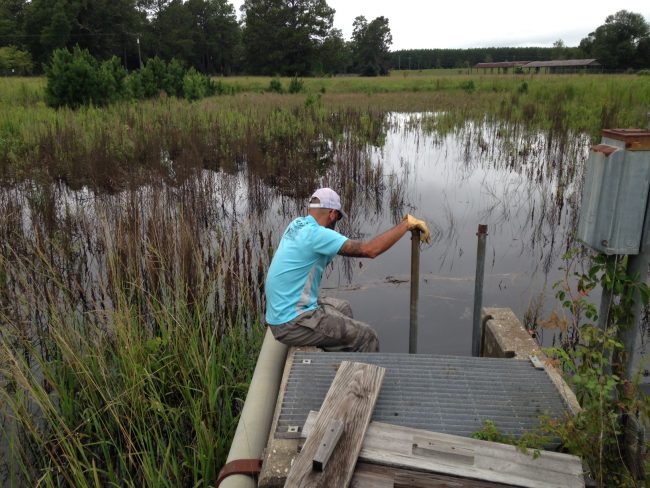Department of Biology researchers bring fish hatchery back to life

Although the Bo Ginn Fish Hatchery has been idle for many years, the Georgia Southern Department of Biology will soon put it to use to conduct cutting-edge research.
The University signed a memorandum of understanding with the U.S. Fish & Wildlife Service (USFWS) to allow University biology students and faculty to use the facility, located in Magnolia Springs near Millen, Georgia, as a resource to better understand the future of ecosystems in the southeastern U.S.
Lance McBrayer, associate dean for Research in the College of Science and Mathematics, said the University is excited to work with the USFWS.
“Our relationship with USFWS and the Bo Ginn Hatchery will substantially increase the research infrastructure available to our faculty and students.”
Associate Professor of biology Checo Colon-Gaud, Ph.D., is leading the initial work at the site. He believes the hatchery is the perfect place to conduct research in the area.
“The many impoundments at the site, which can be filled with water or drained as needed, offer a perfect setting for experiments in aquatic ecology,” said Colon-Gaud.
Most of the experiments will address a basic prediction of climate change. Ephemeral ponds, those that fill from rainfall but dry out weeks or months later, are vital habitats for many species in the southeastern U.S. Yet, changes in rainfall due to climate change are expected to cause these ponds to fill for shorter periods of time or to hold water less predictably. Colon-Gaud and others will conduct experiments to quantify the impacts of such changes on aquatic life.
“The key question is whether animals such as amphibians and insects can complete their life cycles as ponds dry out faster or fill less predictably,” said Colon-Gaud. “The hatchery gives us the ability to manipulate the duration of flooding in many ponds at once so we can measure how aquatic communities respond.”
The significance of these ephemeral ponds extends well beyond the water’s edge. Many insects that start life as aquatic larvae become adults that leave the pond and move into surrounding fields and forests. There they become an important food source for terrestrial animals such as reptiles and birds.
“Although we are studying the ecology of ephemeral ponds, this may be the key to the health of surrounding forests,” said Colon-Gaud.
Georgia Southern University, a public Carnegie Doctoral/Research University founded in 1906, offers 118 degree programs serving 20,673 students. Through eight colleges, the University offers bachelor’s, master’s and doctoral degree programs built on more than a century of academic achievement. Georgia Southern is recognized for its student-centered and hands-on approach to education. Visit GeorgiaSouthern.edu.
Posted in Press Releases

